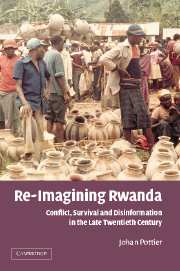Book contents
- Frontmatter
- Contents
- List of maps
- Acknowledgements
- List of abbreviations
- Rwanda
- Great Lakes region
- Rwanda: refugees and displaced populations, 31 March 1995
- Introduction: information and disinformation in times of conflict
- 1 Build-up to war and genocide: society and economy in Rwanda and eastern Zaire
- 2 Mind the gap: how the international press reported on society, politics and history
- 3 For beginners, by beginners: knowledge construction under the Rwandese Patriotic Front
- 4 Labelling refugees: international aid and the discourse of genocide
- 5 Masterclass in surreal diplomacy: understanding the culture of ‘political correctness’
- 6 Land and social development: challenges, proposals and their imagery
- Conclusion: representation and destiny
- Appendix: Summary of key dates and events
- Notes
- Bibliography
- Index
- Titles in the series
2 - Mind the gap: how the international press reported on society, politics and history
Published online by Cambridge University Press: 22 September 2009
- Frontmatter
- Contents
- List of maps
- Acknowledgements
- List of abbreviations
- Rwanda
- Great Lakes region
- Rwanda: refugees and displaced populations, 31 March 1995
- Introduction: information and disinformation in times of conflict
- 1 Build-up to war and genocide: society and economy in Rwanda and eastern Zaire
- 2 Mind the gap: how the international press reported on society, politics and history
- 3 For beginners, by beginners: knowledge construction under the Rwandese Patriotic Front
- 4 Labelling refugees: international aid and the discourse of genocide
- 5 Masterclass in surreal diplomacy: understanding the culture of ‘political correctness’
- 6 Land and social development: challenges, proposals and their imagery
- Conclusion: representation and destiny
- Appendix: Summary of key dates and events
- Notes
- Bibliography
- Index
- Titles in the series
Summary
We used communication and information warfare better than anyone. We have found a new way of doing things.
(Paul Kagame, 8 April 1998)The thin line between information and disinformation blurs in times of conflict and war, all the more so when fighting restricts access to regions and their people. Journalists, commentators and observers, and those reading their reports, must then weigh the credibility of ‘stories’ that are difficult and sometimes impossible to verify. Sifting through these stories, they must seek out conflicting narratives and ask why they exist.
In this chapter, which draws from press reports that appeared in the US, Britain, France, Belgium and The Netherlands, we review three episodes in the recent history of the Great Lakes during which narratives about society, politics and history have been ‘at work’. We ask how these narratives are structured, and will consider the gap between dominant narratives and established academic perspectives. The episodes covered relate to the end of the war in Rwanda (July 1994), the Kibeho massacre in south Rwanda (April 1995) and the Banyamulenge/ADFL campaign in eastern Zaire in late 1996.
As with other chapters in the book, we shall discover how the research-based script on society and history in the Great Lakes region, specifically Rwanda and eastern Zaire, came to be reconsidered under the influence of the Rwandese Patriotic Front (RPF) and Rwanda's first post-genocide government.
- Type
- Chapter
- Information
- Re-Imagining RwandaConflict, Survival and Disinformation in the Late Twentieth Century, pp. 53 - 108Publisher: Cambridge University PressPrint publication year: 2002



